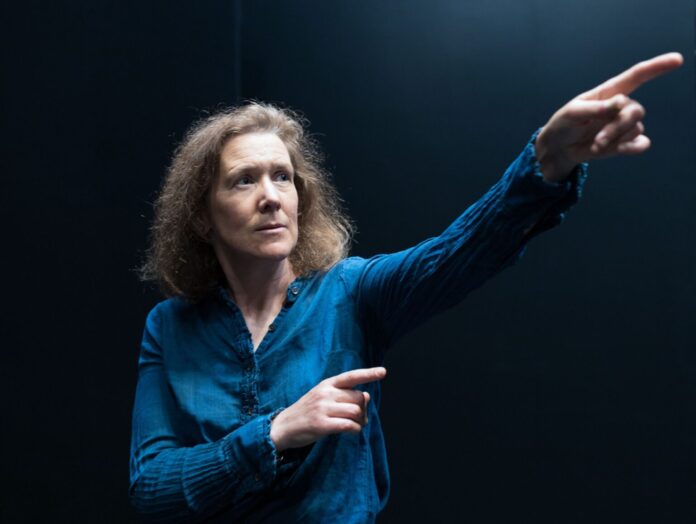As I sat down before the start of Mark of the Minotaur (through December 10 at The Marsh), I couldn’t help but notice that the otherwise-bare set had only two items: a black box that was likely to stand in for a seat, and an NYC Greek coffee cup. I’ve never even been to New York and probably never will, but even I’d recognize those cups anywhere. One can’t help but wonder if playwright-performer Sharon Eberhardt, a New Yorker, used the cup just as nod to her home state or as a subtle-but-specific nod to the Greek mythology subplot of the play?
The main plot follows Eberhardt’s recounting of the life of Alice Kober, a rather-unsung pioneer in linguistics whose work was crucial in deciphering the Linear B clay tablets. As with most of history, this woman’s tale is mostly forgotten in favor of the stories of males who achieved less. Juxtaposed with Kober’s biography is Eberhardt’s retelling of the Greek myth of Ariadne, Theseus, and the Minotaur. In doing so, our hostess wonders aloud if the likely-underaged Ariadne was swept by Theseus due to circumstance, mutual attraction, or because the girl was an opportunist.

She clearly emphasizes with the fictional damsel as much as the real-life heroine. She presents Kober, who achieved so much before dying at age 43, as the ultimate example of a marginalized person who does twice as much to only get half as far—stopping just short of calling linguist Michael Ventris the Moriarty to Kober’s Sherlock. Eberhardt openly declares that she admires the “plain”-featured Kober for doing it all with her intelligence rather than her looks.
Eberhardt tells Ariadne’s story through variations: in one, Ariadne is swept up by the cute guy whose life she saves before he dumps her on an island; in another, Ariadne is a Svengali-like puppet master who used that himbo Theseus to get the hell out of Crete and away from her family. Given that Greek myths were subject to multiple variations—even before the Romans showed up—the idea of revising one of the culture’s most retold stories isn’t as “out there” as one would think.

In the hour-plus that Eberhardt shares the tales of the two women, the CO² levels at the Berkeley Marsh (which, like its SF sibling, still requires proof-of-vax, booster, and masks) peaked around 799ppm on my Aranet4. All that time, Eberhardt herself maintains an amiable presence. She cuts a figure akin to being a university professor speaking to students in the manner of an elementary school teacher. That’s not a knock, that’s more suggestive of a lecturer knowing exactly how what they say would play with a particular audience. Though the shifts from one story to the next are so quick as to be jarring, Mark of the Minotaur is no less of an enlightening biography of someone whose name would otherwise be lost to time.
MARK OF THE MINOTAUR runs through December 10 at The Marsh, Berk. Ticket and more info here.






